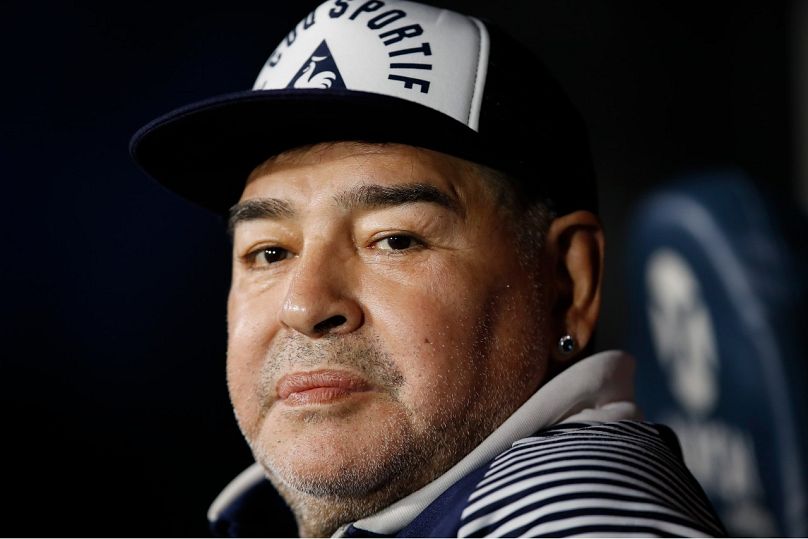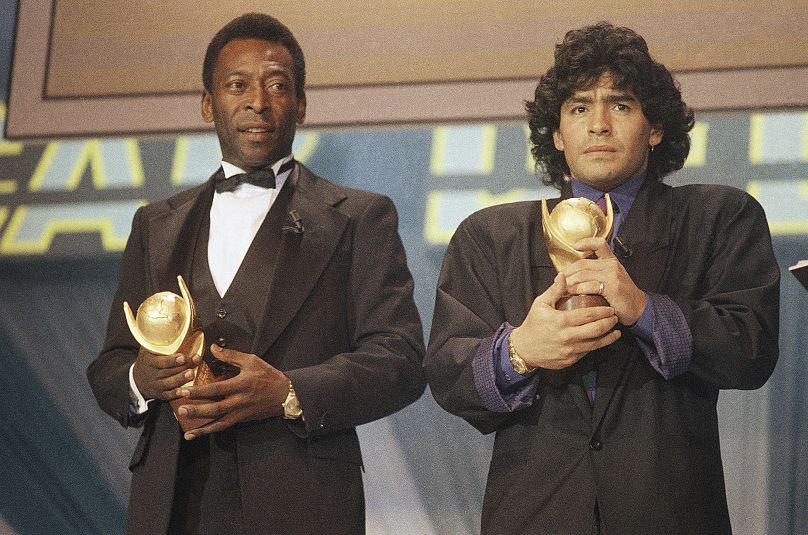As controversial as he was talented, Maradona is a gigantic loss for the beautiful game.
Diego Maradona, perhaps the most talked-about footballer in the history of the game, died on Wednesday, aged 60.
Fans gathered in central Buenos Aires on Thursday to pay their last respects to their football hero.
Footage showed some mourners breaking through crowd control barriers in their eagerness to file past Maradona's coffin inside the presidential palace.
Some also clashed with riot police.
Argentina's favourite son, Maradona was as controversial as he was gifted. He died at home, according to his agent and friend Matías Morla.
The 5 feet 5-inch football wizard had been recovering from an operation to remove a blood clot from his brain and was most recently discharged from hospital near Buenos Aires on 11 November.
Argentina will observe three days of national mourning, the office of the country's president said.
Born in Lanus, Argentina on October 30 1960, Maradona's footballing career began in earnest in the mid-1970s with first divison outfit Argetinos Juniors. He progressed from there to one of his nation's best-known sides, Boca Juniors. And it was there he caught the eye of Spanish giants, Barcelona, who snapped him up in 1982 for what was then a world-record fee of £5m.
In 1984 Maradona was picked up by Napoli, for yet another record fee of £6.9m.
For his country, Maradona earned 91 caps, scoring 34 goals.
Personal reactions came thick and fast. The president of Argentina was one of the first. "You took us to the top of the world. You made us immensely happy. You were the greatest of all," Alberto Fernandez tweeted.
Fellow Argentine and avid football fan Pope Francis remembered Maradona in his prayers on Wednesday, the Vatican said.
Matteo Bruni, spokesman for the Holy See, said that the pope, after being informed of Maradona's death, ``"thinks back fondly to the times they met in these years and remembers him in prayer."
Further tributes have come in from international football stars past and present.
Pelé, three-times World Cup winner with Brazil, who tweeted to say "the world has lost a legend... One day, I hope we can play ball together in the sky".
Fellow Argentine, Barcelona's Lionel Messi simply said "RIP Diego Maradona", posting a photo of the two together. Portuguese star Cristiano Ronaldo commented: "The world says goodbye to an eternal genius. One of the best ever. An unparalleled magician."
And a tweet in disbelief from the British filmmaker Asif Kapadia, who directed the 2019 documentary 'Diego Maradona'.
Former England striker Gary Lineker, who played against Maradona in the infamous World Cup quarter-final at Mexico '86, took to social media to say Maradona was "by some distance the best player of my generation and arguably the greatest of all time".
Maradona took Argentina through to the semi-finals and then to take the title in the final against West Germany. But the match against England stands out for many: Maradona's second goal in a 2-1 victory saw him turn on a sixpence in his own half before dribbling through half the opposing side to score what some still see as the greatest goal of all time.
But minutes earlier, Maradona's first goal was put into Peter Shilton's net by using his hand, which the referee maintained he had not seen. After the game, Maradona was quoted as saying the goal was scored "a little with the head of Maradona and a little with the hand of God". The name stuck. Indeed, Lineker could not let the moment, or the man, pass without mention of it.
"After a blessed but troubled life, hopefully he’ll finally find some comfort in the hands of God," he tweeted.
Reputation and health problems
Although his reputation was tarnished by his addictions and an ill-fated spell in charge of the national team, he remained idolised in football-mad Argentina as the “Pibe de Oro” or “Golden Boy.”
A ballooning waistline slowed Maradona’s explosive speed later in his career and by 1991 he was snared in his first doping scandal when he admitted to a cocaine habit that haunted him until he retired in 1997, at 37.
At the 1994 World Cup in the United States he failed another doping test for stimulants and was thrown out of the tournament.
Hospitalised near death in 2000 and again in ’04 for heart problems blamed on cocaine, he later said he overcame the drug problem.
Cocaine, he once said famously, had proven to be his “toughest rival.”
But more health problems followed, despite a 2005 gastric bypass that greatly trimmed his weight. Maradona was hospitalised in early 2007 for acute hepatitis that his doctor blamed on excessive drinking and eating.
He made an unlikely return to the national team in 2008 when he was appointed Argentina coach, but after a quarterfinal exit at the 2010 World Cup in South Africa, he was ousted — ultimately picking up another coaching job with the United Arab Emirates club Al Wasl.
Number 10
The No. 10 he wore on his jersey became synonymous with him, as it also had with Pelé, the Brazilian great with whom Maradona was regularly paired as the best of all time. In fact, in 2001, FIFA named Maradona one of the two greatest in the sport’s history, alongside Pelé.
Bold, fast and utterly unpredictable, Maradona was a master of attack, juggling the ball easily from one foot to the other as he darted upfield. Dodging and weaving with his low centre of gravity, he shrugged off countless rivals and often scored with a devastating left foot, his most powerful weapon.
“Everything he was thinking in his head, he made it happen with his feet,” said Salvatore Bagni, who played with Maradona at Napoli.
Maradona was the fifth of eight children who grew up in a poor, gritty barrio on the Buenos Aires outskirts where he played a kind of dirt-patch soccer that launched many Argentines to international stardom.
But none of them approached Maradona’s fame.













